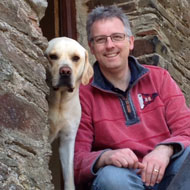'Embrace change, but harness core values'

Kevin Watts believes the veterinary profession must embrace change, but not at the expense of its core values.
Kevin Watts, a candidate in this year's RCVS elections, believes the veterinary profession must embrace change, but not at the expense of its core values of excellent animal care and empathetic communication with clients.
Mr Watts has worked in practice since graduating from the RVC in 1991, becoming a partner in 2001 and a director in 2011. In addition to working in private practice he spent many years working with the Dogs Trust and on the Vets Now advisory board. He is among 13 new candidates standing for election to the RCVS Council this year.
Writing in his candidate manifesto, he says: 'The veterinary profession has evolved remarkably over the last 20 years and I believe that the RCVS needs to continue to embrace and harness this evolution!
'Changes to the demographic in the veterinary workplace, practice ownership, out-of-hours provision and expectations of the wider community have had positive and negative impacts upon the profession.'
While evidence-based medicine is improving clinical outcomes, he says it 'brings with it an enhanced need to effectively communicate and balance costs with clients' expectations'.
Mr Watts also feels the profession should 'embrace the modern-day drive for better work:life balance' and match it with continued exemplary veterinary service.
However, whilst embracing these evolutionary changes, the profession must maintain its core values of excellent animal care and empathetic collaboration and communication between veterinary practitioners and clients.
'To this end, I am passionate about educating veterinary personnel of the future to ensure they are provided with a toolkit of these crucial, often overlooked, central values, alongside expected key clinical competencies,' he explains.
In this climate of evolution, Mr Watts feels it has become 'difficult for veterinary staff to find time/motivation to engage with regulatory bodies such as the RCVS'.
This presents an opportunity to work with practising professionals to 'harness this currently rather silent majority and so help the college provide modern governance that listens to, respects and actively encourages the views of stakeholders.'
Ballot papers will be posted to all veterinary surgeons and nurses that are eligible to vote in the week commencing 13 March. All votes must be cast by 5pm of 28 April 2017.



 The veterinary mental health charity Vetlife is inviting the veterinary community to join it for a sponsored cold-water dip.
The veterinary mental health charity Vetlife is inviting the veterinary community to join it for a sponsored cold-water dip.